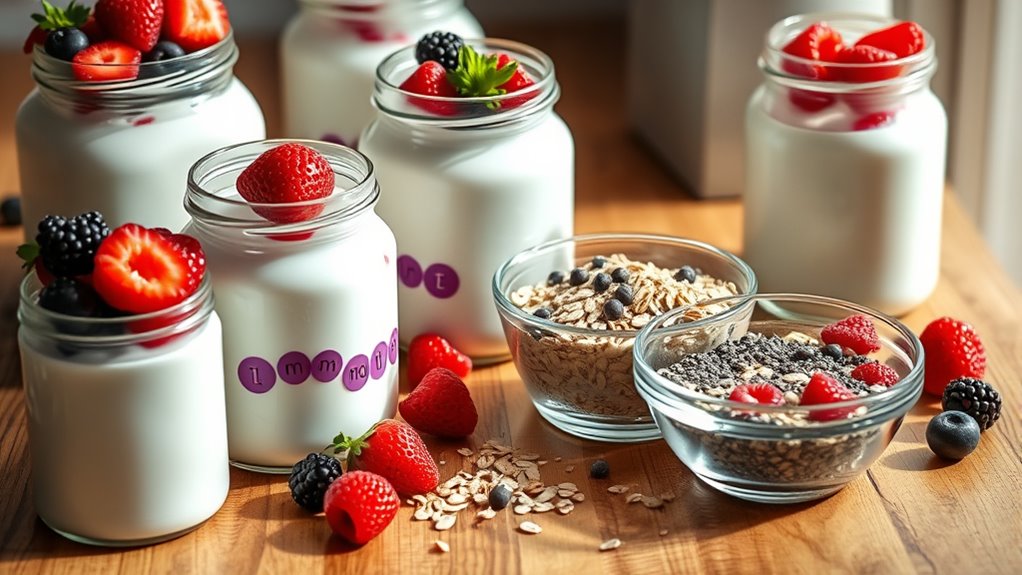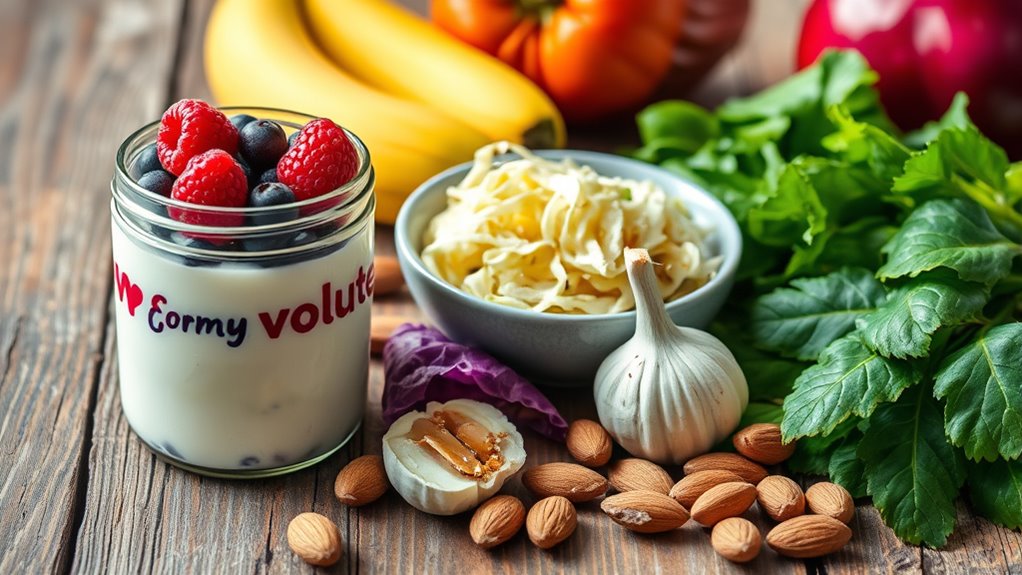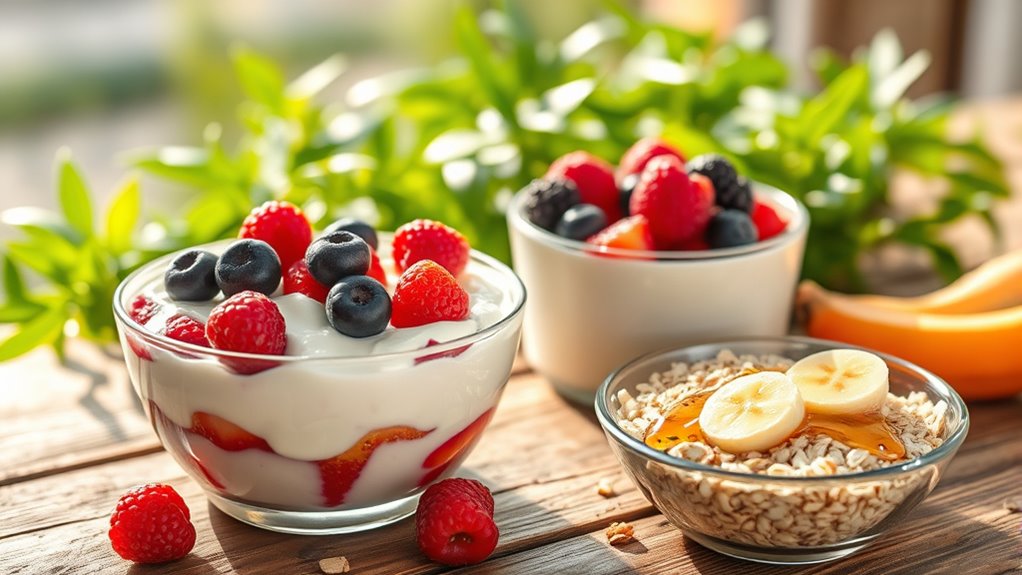Probiotics are live beneficial bacteria found in foods like yogurt and kefir that support your gut health. Prebiotics are fibers from vegetables like garlic and onions that feed these good bacteria. Together, they work symbiotically to improve digestion, boost immunity, and maintain microbiome balance. Understanding their roles helps you make better choices for long-term gut wellness—continue exploring to learn how to incorporate them effectively into your diet.
Key Takeaways
- Probiotics are live beneficial bacteria; prebiotics are fibers that feed and promote the growth of these bacteria.
- Probiotics are found in fermented foods like yogurt and kefir; prebiotics are in fiber-rich vegetables like garlic and onions.
- Probiotics directly add beneficial bacteria to the gut; prebiotics support and nourish existing beneficial bacteria.
- Combining probiotics and prebiotics enhances gut microbiome diversity, resilience, and overall digestive health.
- Using both together offers synergistic benefits for immunity, nutrient absorption, and gut balance.
Understanding Probiotics: The Good Bacteria

Probiotics are live bacteria that provide health benefits when you consume them in adequate amounts. These beneficial microorganisms come from various probiotic strains, each with unique properties that support your digestive health. By introducing different probiotic strains into your diet, you can help enhance bacterial diversity in your gut, which is vital for maintaining a balanced microbiome. A diverse bacterial community can improve digestion, boost immunity, and even influence your mood. Not all probiotics are the same; some are better suited for certain health needs than others. When choosing probiotic-rich foods or supplements, look for products with multiple strains to maximize bacterial diversity and guarantee you’re getting a broad spectrum of benefits from these good bacteria.
The Role of Prebiotics in Digestive Health

Have you ever wondered how to naturally nourish the beneficial bacteria in your gut? Prebiotics are key—they’re the fibers and compounds that feed your microbiome, promoting diversity among beneficial bacteria. When your microbiome is diverse, it functions better, supporting digestion and overall health. Prebiotics also play a role in immune modulation, helping your body respond appropriately to threats. By including foods like garlic, onions, and bananas, you can enhance your gut environment and strengthen your immune system. These beneficial bacteria rely on prebiotics to thrive, making dietary choices crucial for maintaining a healthy microbiome. Unlike probiotics, which add beneficial bacteria, prebiotics serve as the fuel that allows these bacteria to thrive and multiply. Incorporating prebiotics into your diet is a simple but powerful way to support digestive health and maintain a balanced, resilient gut. A holistic approach to health recognizes the importance of nurturing your microbiome for overall well-being.
How Probiotics and Prebiotics Interact

Prebiotics give your probiotics the nutrients they need to thrive, strengthening their presence in your gut. This interaction creates a symbiotic relationship that benefits your digestive system. Together, they help maintain a balanced gut microbiome, supporting overall health. Incorporating whole foods rich in prebiotics can further enhance this beneficial relationship. Additionally, choosing foods that are rich in resilient fibers can maximize the growth and activity of beneficial bacteria in your gut. Consuming a variety of prebiotic-rich foods ensures a diverse and robust microbiome. Proper storage of fermentation products can also help preserve their probiotic qualities and effectiveness.
Prebiotics Nourish Probiotics
Since prebiotics serve as food for beneficial bacteria, they play a crucial role in supporting probiotic health and activity. When you consume prebiotic fibers, they reach your gut undigested, providing nourishment for probiotic strains. This nourishment helps these beneficial bacteria multiply and thrive, enhancing their ability to maintain a healthy balance in your digestive system. Different probiotic strains respond to specific prebiotics, so incorporating a variety of prebiotic fibers can optimize their growth. Identifying ripe honeydew is essential to ensure you’re consuming the freshest fruits that support your overall health. Additionally, understanding the role of automation in business can help in developing strategies to optimize health-related technologies. By feeding your probiotics, prebiotics strengthen their effectiveness, supporting digestion, immunity, and overall gut health. Fundamentally, prebiotics act as the fuel that keeps your probiotic bacteria active and healthy, creating a symbiotic relationship that benefits your entire digestive system.
Symbiotic Relationships Formed
Probiotics and prebiotics form a dynamic partnership in your gut, working together to promote overall health. This relationship exemplifies mutualism, where both benefit—probiotics thrive on prebiotics as their food source, while prebiotics support the growth of beneficial bacteria. Over time, this interaction reflects coevolution, as these microorganisms adapt to each other’s presence, optimizing their functions. The symbiotic relationship enhances your gut’s environment, helping maintain a diverse and resilient microbiome. It also influences the production of vital nutrients like short-chain fatty acids, which are crucial for gut health metabolic processes. By fostering this cooperation, you support the natural processes that aid digestion, boost immunity, and prevent harmful bacteria from taking hold. Supporting a healthy microbiome can also improve your mental well-being, considering the gut-brain connection. Maintaining a healthy balance between probiotics and prebiotics is essential for long-term gut health and overall wellness. Additionally, nurturing this alliance can lead to improvements in mental well-being, considering the gut-brain connection.
Gut Microbiome Balance
The balance of your gut microbiome depends on how effectively probiotics and prebiotics work together to shape a thriving microbial community. When they collaborate, they enhance microbiome diversity, which boosts resilience against pathogens. Probiotics introduce beneficial strains, supporting a healthy gut barrier, while prebiotics fuel these microbes’ growth. To optimize this balance:
- Incorporate a variety of fiber-rich prebiotics to promote diverse microbiome populations.
- Consume probiotic foods or supplements to add beneficial strains directly.
- Maintain a diet low in processed foods that can harm microbiome diversity.
- Avoid unnecessary antibiotics that disrupt the gut barrier integrity.
- Ensuring the quality and authenticity of probiotic products can maximize their effectiveness, as verified brand reputation and certifications provide confidence in their safety and potency. Additionally, understanding the role of diet in microbiome health can further enhance probiotic and prebiotic synergy.
- Regularly monitoring your gut health through available testing methods can help tailor your approach for optimal results.
Together, probiotics and prebiotics help strengthen your gut barrier, improve digestion, and foster a balanced, resilient microbiome.
Common Food Sources of Probiotics and Prebiotics

You can find probiotics in fermented dairy products like yogurt and kefir, which help support your gut health. Prebiotics are abundant in fiber-rich vegetables such as broccoli and carrots, fueling beneficial bacteria. Additionally, fermented beverages like kombucha provide a tasty way to incorporate probiotics into your diet. Being mindful of cranberry juice consumption can also contribute to overall health benefits. Including a variety of gut-friendly foods can further enhance your digestive wellness. Incorporating diverse prebiotic sources ensures a balanced and thriving gut microbiome.
Fermented Dairy Products
Have you ever wondered where to find natural sources of beneficial bacteria and prebiotics? Fermented dairy products are excellent options, thanks to dairy fermentation processes that enhance probiotic content. These products contain various probiotic strains that promote gut health. To get the most benefits, look for these common options:
- Yogurt with live cultures
- Kefir, a fermented milk drink
- Traditional buttermilk
- Some aged cheeses, like gouda and cheddar
These foods naturally harbor probiotic strains formed during fermentation, supporting your digestive system. They also serve as rich sources of prebiotics that nourish beneficial bacteria. Incorporating fermented dairy products into your diet can be a simple, tasty way to boost gut health naturally. Additionally, understanding the artistic and cultural significance of these products can deepen your appreciation for their role in traditional culinary practices.
Fiber-Rich Vegetables
Fiber-rich vegetables are an excellent addition to your diet for supporting gut health, especially since they naturally contain prebiotics that feed beneficial bacteria. These fiber vegetables include options like broccoli, Brussels sprouts, leeks, garlic, onions, asparagus, and artichokes. Consuming a variety of these foods helps promote a healthy microbiome by providing the necessary fuel for good bacteria to thrive. When you incorporate fiber vegetables into your meals, you’re not only boosting your fiber intake but also supporting digestion and overall gut function. These vegetables are versatile and easy to include in salads, stir-fries, and soups. Regularly eating fiber-rich vegetables ensures your gut bacteria stay nourished, which can lead to better immunity, improved nutrient absorption, and overall well-being. Additionally, incorporating these vegetables into your meals can help you practice mindful eating, fostering a more balanced approach to nutrition. Studies also suggest that digital literacy programs encourage playful communication, making it easier for seniors to enjoy and share their dietary journey. Supporting your gut health with a variety of fiber-rich vegetables can also contribute to long-term digestive health and overall wellness. Including a diverse range of these foods can further enhance your gut microbiome diversity, leading to more resilient digestive health.
Fermented Beverages
Fermented beverages are a popular and convenient way to boost your intake of probiotics and prebiotics, which support a healthy gut microbiome. These drinks contain various fermented foods that harbor beneficial probiotic strains, helping improve digestion and immunity. Common examples include kefir, kombucha, kvass, and traditional fermented fruit drinks. Each offers unique probiotic strains that enhance gut health.
- Kefir provides a broad spectrum of probiotic strains for diverse gut support.
- Kombucha contains antioxidants alongside probiotics, aiding detoxification.
- Kvass, made from fermented bread, offers a mild probiotic boost.
- Fermented fruit drinks deliver prebiotics and probiotics, fueling healthy bacteria.
Incorporating these fermented beverages into your diet supports your gut microbiome naturally and deliciously.
Benefits of Incorporating Both Into Your Diet

Incorporating both probiotics and prebiotics into your diet offers a powerful way to support your digestive health and boost your immune system. Probiotics introduce beneficial bacteria that enhance your gut microbiome, strengthening the gut-brain connection and improving mental clarity. Prebiotics serve as fuel for these good bacteria, helping them thrive and maintain balance. Together, they foster a healthier gut environment, which is linked to better nutrient absorption and reduced inflammation. This balanced microbiome also plays a fundamental role in strengthening your immune defense, making you less susceptible to illnesses. By regularly including probiotic-rich foods like yogurt and fermented vegetables, along with prebiotic sources such as fiber-rich fruits and vegetables, you actively promote overall wellness and resilience.
Tips for Optimizing Your Gut Health

To optimize your gut health, focus on making mindful dietary choices that support your microbiome. Incorporate lifestyle habits that promote digestion, such as regular exercise and adequate sleep. Pay attention to supplement timing; taking probiotics on an empty stomach can improve their effectiveness. Consider gradually increasing fiber intake from prebiotic-rich foods like garlic, onions, and bananas. Staying hydrated helps maintain gut lining integrity and aids digestion. Manage stress through mindfulness or relaxation techniques, as stress can disrupt your microbiome balance. Finally, avoid excessive antibiotic use unless prescribed, since it can wipe out beneficial bacteria. By combining these strategies, you create an environment that nurtures your gut bacteria, leading to better overall health and digestion.
Frequently Asked Questions
Can Probiotics and Prebiotics Be Taken Together Safely?
You can safely combine probiotics and prebiotics, as they work together to improve your gut health. Combining supplements is generally safe, but it’s best to start with small doses to see how your body reacts. You can also get both from natural food sources like yogurt, kefir, bananas, and garlic. Always check with your healthcare provider before adding new supplements, especially if you have underlying health conditions.
Are There Any Side Effects From Consuming Probiotics or Prebiotics?
When you consume probiotics or prebiotics, you might experience some side effects. Digestive discomfort, like gas or bloating, is common as your gut adjusts. Rarely, you could have allergic reactions, especially if you’re sensitive to certain strains or ingredients. If you notice severe symptoms or persistent issues, it’s best to consult a healthcare professional. Generally, these supplements are safe, but paying attention to your body helps prevent adverse effects.
How Long Does It Take to See Benefits From Probiotics and Prebiotics?
Imagine your gut as a garden needing care; you’ll start to see the blooms of better gut health and digestion within a few days to a few weeks. Typically, you notice improvements in digestion and overall gut health between 1 to 3 weeks of regular probiotic or prebiotic use. Consistency is key—stick with it, and your digestive system will thank you as it begins to flourish.
Can Probiotics and Prebiotics Help With Specific Health Conditions?
Yes, probiotics and prebiotics can help with specific health conditions by supporting your gut flora and boosting immune support. Probiotics introduce beneficial bacteria that may improve digestion, reduce inflammation, and alleviate issues like diarrhea or irritable bowel syndrome. Prebiotics feed those good bacteria, enhancing their effectiveness. Together, they promote overall gut health, which can positively impact your immune system and help manage certain health concerns more effectively.
Are Supplements Better Than Natural Food Sources for Probiotics and Prebiotics?
While supplements offer convenience, dietary sources usually provide a broader range of beneficial bacteria and nutrients, enhancing overall gut health. Supplements can be effective, but their efficacy depends on quality and proper usage. You benefit most when you combine natural foods like yogurt, kefir, or fiber-rich produce with supplements if needed. Ultimately, choosing natural sources supports a balanced microbiome, but supplements can fill gaps when dietary intake falls short.
Conclusion
By understanding probiotics and prebiotics, you empower your gut, support your digestion, and boost your overall health. Embrace the good bacteria, nourish them with the right foods, and enjoy the harmony of a balanced gut. Prioritize variety, consistency, and mindful choices to optimize your gut health. In nurturing your gut, you nurture your well-being, and in caring for your gut, you cultivate vitality, resilience, and long-term wellness.










